Oyster Mushroom
(Pleurotus ostreatus)
Conservation • Description • Habitat • Ecology • Distribution • Taxonomy
|
|
|||||||||||||
Description |
Oyster Mushroom is a large, fleshy, bracket (shelf-like) fungus. It is usually saprobic, on decaying stumps and logs, but is sometimes parasitic, on the sides of injured trees. This mushroom is found usually on hardwoods, especially elm, cottonwood, alder, and oak. It is rarely found on conifers. It usually appears as overlapping shelves on a log or stump, sometimes on a live tree. It enters the tree through a wound and infects the wood causing white rot. It first appears in the fall after a heavy rain. There is usually no stalk unless it is growing on top of a log. If there is a stalk, it is short, ¼″ to 1½″ long, thick, and off-center or even laterally attached. If growing on top of a log the stalk may be centrally attached. The cap is oyster-shaped or fan-shaped and 1½″ to 8″ in diameter. When young it is convex and the margin is rolled inward. As it matures it becomes flat or occasionally funnel shaped. The upper surface is smooth and variable in color; white to gray, grayish-brown, or tan, sometimes dark brown. When wet it is somewhat slippery or greasy but not slimy or sticky. The margins are often wavy or lobed. The flesh is thick, white, and firm but soft. It is edible and has a mild odor and taste. There is no universal veil. The gills are broad, close to well-spaced, and run down the stalk if there is one (decurrent). They are white or tinged gray, becoming tinged yellow on older specimens. The spore print is whitish, pale lilac, or gray. |
Similar Species |
Habitat and Hosts |
Hardwoods, especially elm, cottonwood, alder, and oak. Usually on a stump or log. |
Ecology |
Season |
Fall through early spring |
Distribution |
||
|
Sources |
|
| 5/29/2024 | ||
Occurrence |
||
Common and widespread |
||
Taxonomy |
|
Kingdom |
Fungi (Fungi) |
Subkingdom |
Dikarya |
Phylum |
Basidiomycota (Basidiomycete Fungi) |
Subphylum |
Agaricomycotina (Higher Basidiomycetes) |
Class |
Agaricomycetes (Mushrooms, Bracket Fungi, Puffballs, and Allies) |
Order |
|
Suborder |
Pleurotineae |
Family |
Pleurotaceae |
Genus |
Pleurotus (oyster mushrooms) |
The genus Pleurotus was formerly placed in the family Tricholomataceae. Molecular phylogenetic analysis resulted in several new families, including Pleurotaceae, being separated from Tricholomataceae by 2006. |
|
Subordinate Taxa |
|
|
|
Synonyms |
|
Agaricus ostreatus Crepidopus ostreatus Pleuropus ostreatus Clitocybe ostreata Dendrosarcus ostreatus Pleurotus peregrinus Pleurotus pulmonarius sensu auct. |
|
Common Names |
|
Grey Oyster Mushroom Oyster Mushroom Tree Oyster Mushroom |
|
Glossary
Saprobic
A term often used for saprotrophic fungi. Referring to fungi that obtain their nutrients from decayed organic matter.
Visitor Photos |
||
Share your photo of this fungus. |
||
This button not working for you? |
||
Brad Creager |
||
 |
 |
|
Pleurotus Ostreatus? Took these photos this morning near Prior Lake, MN. Wondering if they are edible, oyster mushrooms? |
|
|
 |
|
|
Paul |
||
 |
||
 |
||
Valerie Thomas |
||
It's growing in my backyard on a berm that is probably has construction materials and tree remnants under the sod from when the house was built in 1997. If someone would like to "harvest" it, contact me at vjthomas66@gmail.com. |
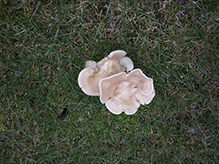 |
|
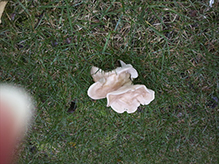 |
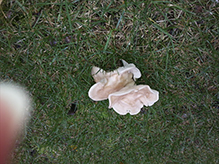 |
|
Patrick |
||
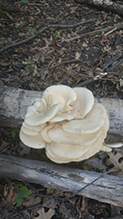 |
|
|
| what is this? |
|
|
Robert Briggs |
||
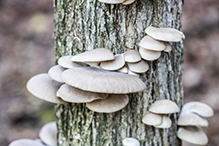 |
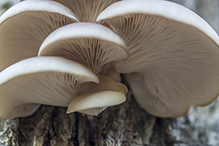 |
|
Cheray Farm |
||
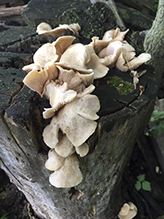 |
|
|
| It is growing out of a dead elm or oak. Looks like an oyster. |
|
|
MinnesotaSeasons.com Photos |
||
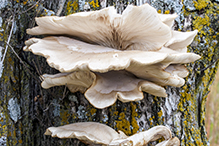 |
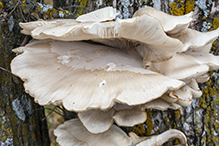 |
|
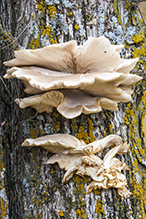 |

Slideshows |
Oyster Mushrooms |
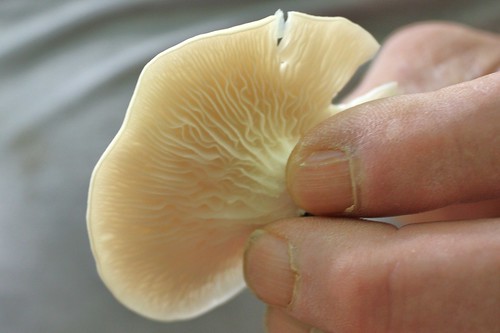
|
About
Pleurotus ostreatus very luscious (so I've been told) |

Visitor Videos |
||
Share your video of this fungus. |
||
This button not working for you? |
||
|
Other Videos |
||
Oyster Mushroom Hunting, Foraging, Identification : GardenFork.TV |
About
Published on Dec 2, 2012 Mushroom Identification, Foraging, and Hunting for mushrooms how-to video. Oyster mushrooms are common and edible, but be sure you know how to identify mushrooms. Watch all our mushroom hunting vids here: https://www.youtube.com/watch?v=elfssVLI2uY&list=PLK9GxIRaLC5Vt-O2sOjXpoR3dLZzPHwHC Start learning mushroom identification here. Mushroom Identification Books: Watch our Mushroom Cooking Video: http://youtu.be/Xz1Fz2f5KxM Twitter: http://twitter.com/gardenforktv Facebook: http://facebook.com/gardenfork Google+: https://plus.google.com/+gardenfork/ Pinterest: http://http//pinterest.com/gardenforktv/ More great DIY, Cooking, Gardening, Home Improvement, Urban Homesteading videos and info on our site: http://GardenFork.TV Produced by GardenFork Media LLC ©2014 all rights reserved All embeds must live link to GardenFork.TV. No Editorial Excerpts without permission, Violators agree to pay $5,000 per second + $10 per view + all collections & lawyers fees Music: Happy Hour, Composed by Dale Herr (ASCAP) , Toast Factory Publishing (ASCAP) Recording Licensed from the UniqueTracks Production Music Library Inc. |

Visitor Sightings |
||
Report a sighting of this fungus. |
||
This button not working for you? |
||
Paul |
Location: St. Cloud, MN |
 |
| Mark Volesky 10/4/2022 |
Location: West Becker County Difficult to identify the old dead tree. It is loaded with them |
|
| Jeanne 4/21/2022 |
Location: Mower County, SE Minnesota on Iowa border Found 4.21.22 on a deadfall old elm tree that had been dead for many years. Last summer July 2021 I found my first oysters on this tree that had 8” caps. The elm had produced several oysters from mid summer to late fall 2021, until it fell from a strong wind in late November. |
|
Apricity Apricity |
Location: Martin County, Fairmont, MN |
|
| Patrick 5/22/2018 |
Location: Coon Rapids MN what is this? |
 |
| Robert Briggs 11/5/2016 |
Location: Spring Lake Park Reserve |
 |
| Cheray Farm 8/18/2016 |
Location: Albany MN It is growing out of a dead elm or oak. Looks like an oyster. |
 |
MinnesotaSeasons.com Sightings |
||

Created: Last Updated: © MinnesotaSeasons.com. All rights reserved. |




